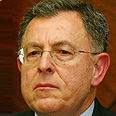
More than 300 killed in Lebanon
Lebanese PM calls for international intervention in Lebanon, demands world offer humanitarian aid to country. Hizbullah MP says organization ready to continue fighting for months. Subtle criticism of Hizbullah, Tehran and Damascus continues to emanate from anti-Syrian circles
In a television appearance Siniora also demanded that the world offer humanitarian aid to Lebanon. According to the PM, over 300 people were killed and some 1,000 have been injured since the fighting began. He stated that more than 500,000 Lebanese have been rendered refugees as a result of the war.
Earlier on Wednesday, Lebanese Parliament Member representing Hizbullah Amin Shari said that the organization was ready to continue fighting Israel for many more months. "The Lebanese people are the victims, and the perpetrator is the Zionist enemy. The victim must not surrender to the aggressor," he stated.
'We are prepared for ceasefire'
In an interview with news channel al-Arabiya, Shari was asked for how much longer would his organization be able to carry on with the war, which has been devastating Lebanon, and replied: "From the moment the enemy waged an all-out war on us, we declared we were ready. This is why we are on the highest alert level, which allows us to confront and resist the Israeli enemy, not only for days and weeks, but months too."
Referring to reports that serious, secretive mediation efforts were being held behind the scenes, Shari said: "At the moment there are no promising initiatives, only some ideas that were raised by UN and EU delegates via the media. We are all for an unconditional ceasefire. The main purpose of kidnapping the soldiers was to have them exchanged for Lebanese prisoners."
"We are not being adventurous in our war against the Israeli enemy. The purpose of our actions is to achieve victory, as we did in 2000. The Israeli enemy wanted to escalate the situation and Hizbullah has the means to hurt the Israeli enemy," he stated, commenting on the possibility that his group would attack Tel Aviv.
'Decision in Hizbullah's hands'
Meanwhile, criticism of Hizbullah continued to emanate from anti-Syrian circles, although its expression was restrained and subtle. Among the chief spokespeople against Hizbullah was head of the anti-Syrian political body and Lebanese parliamentary majority leader Saad al-Hariri.
After commenting Monday that after the conflict will come the time to square things with Hizbullah, and hinting criticism towards the organization’s patrons in Damascus and Tehran Tuesday, Hariri once again questioned Hizbullah’s tactics on Wednesday. “We support the resistance, but is what is happening in Lebanon the right thing?” Hariri questioned during an interview with al-Arabiya from Rome. He also attacked Syria, saying Lebanon “doesn’t want to be the country in conflict with Israel (ed. - for the benefit of Syrian interests),” and that in any case Syria was not interested in positive ties with Lebanon.
Hariri also sent a clear message to Israel. He responded to a question on Israel’s demand that UN resolution be enforced, saying, “If Israel wants the UN decision to be implemented, they must withdraw from Shaba Farms, as the decision establishes that foreign armies must leave Lebanon. Regarding Palestinian weapons and Hizbullah (ed. – the resolution requires their disarmament), we discussed the issue in the framework of national talks.” He added that an overall agreement would require the release of Lebanese prisoners held in Israel.
In response to a question on whether he believed the ball was in Hizbullah's or Iran’s court now, Hariri said, “I hope the decision is in Hizbullah's hands.”
‘Like a fish in water’
Hariri is not the only one who has publicly criticized Hizbullah. Another former parliament member and member of the Christian Phalanges party, Fuad Abu Nader, was more blunt in his statements. In an interview with al-Jazeera, he said, “In 2000 there was not one Lebanese person that didn’t support Hizbullah. All the Lebanese, myself included, shared in the strong stance of resistance against Israel.
Thus in Operation Grapes of Wrath, we operated from abroad and went to the White House and the Elysees Palace (French presidential residence) to protest. However, now the situation is not the same because the war was started unilaterally (by Hizbullah), and they dragged the whole country into a state of destruction and war. You’d be hard pressed to find the same atmosphere of strong resistance among the Lebanese people today as in 2000.”
“Hizbullah is like a fish in water," he added. "As soon as the water goes down, it’ll be weakened.”










